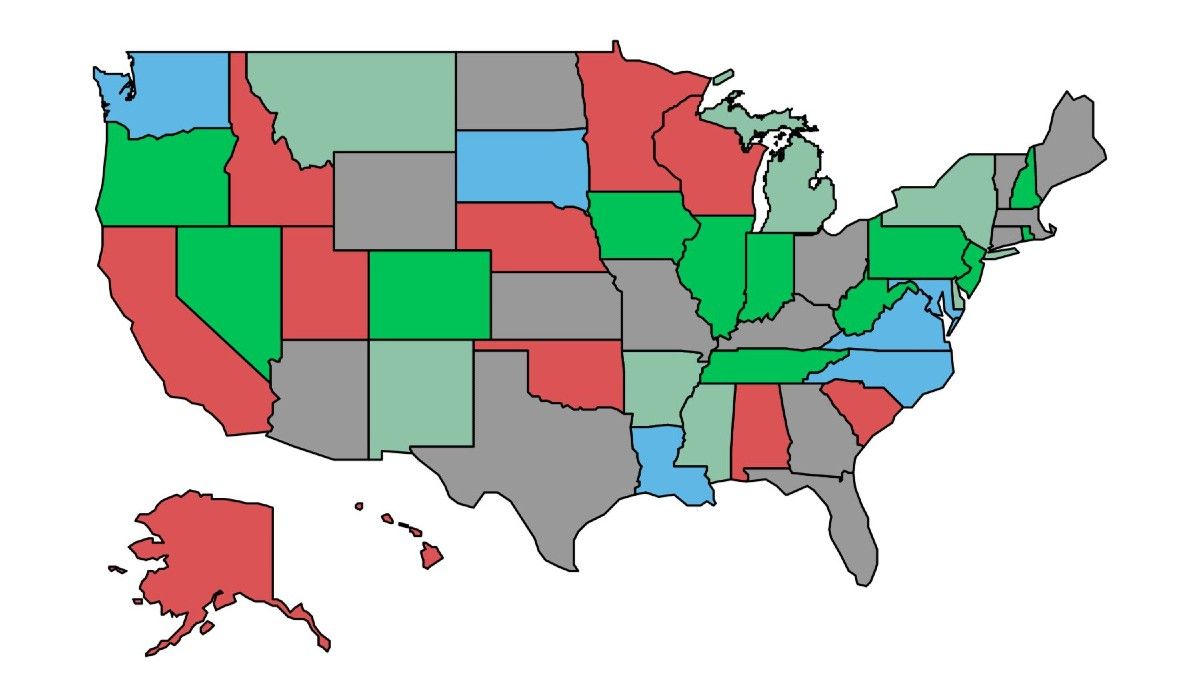Virginia Gambling Laws
 © Shutterstock Simple marijuana possession will be decriminalized and may only result in a civil penalty up to $25 in Virginia starting on July 1.
© Shutterstock Simple marijuana possession will be decriminalized and may only result in a civil penalty up to $25 in Virginia starting on July 1.

VIRGINIA — The start of July means two things in Virginia: the start of phase three of the Forward Virginia reopening plan and new legislation taking effect. Hundreds of new laws take effect Wednesday, July 1, in Virginia that will have impacts on voting, gun sales, driving, marijuana possession offenses, state holidays and more.
Some laws passed during the 2020 Virginia General Assembly session won't take effect right away. A law allowing localities to implement a 5-cent plastic bag tax will take effect on Jan. 1, 2021. The minimum wage of $7.25 per hour will increase to $9.50 per hour on May 1, 2021, then $11 per hour on Jan. 1, 2022, $12 per hour on Jan. 1, 2023, $13.50 per hour on Jan. 1, 2025 and $15 per hour on Jan. 1, 2026. A bill prohibiting a driver from holding a handheld personal communications device will take effect on Jan. 1, 2021; the current law bans reading emails or texts, entering letters or texts on a device, and holding a device while driving in a work zone.

Here's a summary of the key Virginia laws that take effect on July 1:
- No-excuse absentee voting: This legislation allows any registered voter to vote absentee in elections. This removes the list of reasons under which a person may be entitled to vote by absentee ballot.
- Photo ID requirement removed: This legislation removes the requirement that voters show a form of identification with a photograph in order to be allowed to vote. However, a voter can must show documentation, such as a voter registration confirmation document, valid Virginia driver's license, valid United States passport, copy of a current utility bill, bank statement, government check, paycheck and other acceptable documents.
- Automatic voter registration: This legislation directs the Virginia Department of Motor Vehicles to send certain information for any person using certain DMV services to the Virginia Department of Election. This information would be sent by automatic electronic transmission if a person indicates citizenship, is 17 years of age or older, and does not decline to have the information transmitted to the Department of Elections for voter registration purposes.
- Decriminalizing marijuana: This bill decriminalizes simple marijuana possession but allows a civil penalty of no more than $25. Before the law, a first offense could carry a maximum fine of $500 and a maximum 30-day jail sentence, and subsequent offenses are a Class 1 misdemeanor. A simple possession of marijuana will be charged by a summons in the same form as motor vehicle law violations, and no court costs may be assessed for a violation.
- Driver's license suspensions: Under new legislation, a driver's license cannot be suspended when convicted of or placed on deferred disposition for a drug offense, for non-payment of certain fees owed to a local correctional facility or regional jail, and for shoplifting motor fuel.
- Background checks for gun sales: This legislation establishes a background check requirement for any firearm sale and directs the Department of State Police to establish a process for transferors to obtain such a background check from licensed firearms dealers. Selling or buying a gun without obtaining a background check could lead to a Class 1 misdemeanor charge. State Police will have three business days to complete a background check before a firearm may be transferred.
- Limit on handgun purchases: This bill prohibits any person who is not a licensed firearms dealer from buying more than one handgun in a 30-day period. An offense would be considered a Class 1 misdemeanor.
- Report lost or stolen firearms: A lost or stolen firearm must be reported to a law enforcement agency or State Police within 48 hours after the legal owner learns it is missing. A person who reports the loss or theft 'in good faith' does not face criminal or civil liability for acts or omissions that result from the loss or theft. The legislation asks the law enforcement agency to enter the report information into the National Crime Information Center. The bill does not apply to the loss or theft of an antique firearm.
- Removal of firearms from person with risk to self or others: This legislation creates a procedure by which any commonwealth's attorney or law enforcement officer may apply to a general district court, circuit court, or juvenile and domestic relations district court judge or magistrate for an emergency substantial risk order to prohibit a person who poses a substantial risk of injury to himself or others from purchasing, possessing, or transporting a firearm.
- Localities' authority to enact gun bans: Localities can adopt an ordinance to prohibit the possession or carrying of firearms, ammunition, or components in a building owned or used by such locality for governmental purposes, any public park owned or operated by the locality, any recreation or community center facility, and any public street, road, alley, sidewalk or public right-of-way used by or adjacent to a permitted event.
- Stop for pedestrians: This law clarifies the responsibility of drivers to stop when yielding to pedestrians at clearly marked crosswalks, pedestrian crossings and any intersection when the driver is approaching on a highway with a speed limit up to 35 miles per hour. The bill also prohibits the driver of another vehicle approaching such stopped vehicle from an adjacent lane or from behind from overtaking and passing the stopped vehicle.
- War memorial removal by localities: A locality remove, relocate, contextualize, or cover any monument or memorial for war veterans on the locality's public property and removes certain criminal and civil penalties.
- Robert E. Lee statue in U.S. Capitol: This legislation the Commission for Historical Statues in the United States Capitol to determine whether the Robert E. Lee statue in the National Statuary Hall Collection at the United States Capitol should be replaced. A recommendation for a replacement would go to the Virginia General Assembly. The replacement would be defined as a 'prominent Virginia citizen of historic renown or renowned for distinguished civil or military service to be commemorated in the National Statuary Hall Collection.'
- Casino gambling: This legislation allows casino gaming regulated by the Virginia Lottery Board. This only applies in eligible localities that met criteria: the Cities of Portsmouth, Richmond, Norfolk, Danville and Bristol. Each city would hold a referendum on the question of whether to allow casino gaming in the city in the November 2020 general election (with the exception of Richmond). An 18 to 30 percent tax on adjusted gross receipts of licensees would be imposed, depending on the licensee's annual adjusted gross receipts.
- New holiday: This legislation designates Election Day, the Tuesday after the first Monday in November, as a state holiday and removes Lee-Jackson Day as a state holiday.
- Fornication repealed as crime: This bill repeals the crime of fornication — voluntary sexual intercourse by an unmarried person. Before the bill, it was a Class 4 misdemeanor.
- Inquiry of immigration status for certain victims and witnesses: Law enforcement officers are prohibited from inquiring into the immigration status of a person who reports being a victim of a crime or a parent or guardian of a minor victim of a crime as well as witnesses in the investigation of a crime or the parent or guardian of a minor witness. A law enforcement officer is not prohibited from making this inquiry 'if it is necessary for the enforcement or implementation of certain criminal provisions or if the parent or guardian has been arrested for, has been charged with, or is being investigated for a crime against the minor victim.'
- School principal reporting misdemeanors: This bill gets rid of the requirement that school principals report to law enforcement certain acts that may constitute a misdemeanor offense.
- Notice for school lockdown drills: Public schools are required to give parents at least 24 hours' notice of a lock-down drill.
- Transgender student policies in schools: The Virginia Department of Education is directed to create policies regarding the treatment of transgender students in public elementary and secondary schools. Policies addressing common issues regarding transgender students should be provided to school boards by December 31, 2020. By the 2021-2022 school year, school boards would have to adopt policies consistent with or more comprehensive than model policies developed by the Department of Education.
- Menstrual products in schools: School boards should make tampons or pads available at no cost to students in middle and high school bathrooms and areas deemed appropriate in elementary schools.
- Digitizing state police tickets: The legislation creates the Virginia State Police Electronic Summons System Fund for digitized tickets. This is funded by a $5 fee in each criminal or traffic case in which the Virginia State Police issues a summons, ticket or citation.
- Police body-worn camera programs: Localities should adopt and establish a written policy for the operation of a body-worn camera system for law enforcement. The bill also requires the Department of Criminal Justice Services to create a model policy for operating body-worn camera systems as well as storing and maintaining body-worn camera system records.
Gambling Laws in Virginia. Virginia is limited when it comes to legal gambling options. Within the state’s borders, residents won’t find casinos, racinos, card rooms, tribal casinos, or sports betting. The only types of gambling activities that are approved in the state are daily fantasy games, the. However, despite removing a federal ban on sports gambling in May 2018, many states were still unable to push new laws across the finish line. Virginia’s lawmakers debated sports betting proposals for most of.
Virginia Gaming Laws
Virginia Gambling Updates - Last Updated 6/2/2013. Whenever there are updates to Virginia's gambling laws or situations you'll find them here in this section. 3-1-2013 - The Virginia State Supreme Court decides not to decide whether or not poker is a game of skill. The minimum legal gambling age in the state of Virginia requires players to be at least 18 years of age in order to participate in charitable gambling, lotteries, daily fantasy sports, and pari-mutuel wagering on horses. It is unknown if the state will create a minimum age.

Virginia Gaming Legislation
Virginia gambling law falls somewhere in the middle of the spectrum. It’s far from being as liberal as the laws enjoyed by residents of Nevada, but it’s also not as restrictive as what can be found in Hawaii or Utah. The state has maintained a balancing act for decades, although the overall gambling industry has slowly grown over the years.